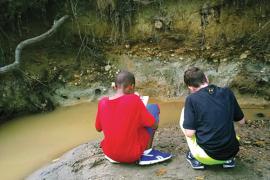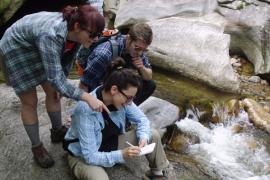W.L. Lorimer, founder of Lorimer Family Camps, included the cavalry style of horsemanship along with the athletics, aquatics, and outdoor skills that were the basics for all camps in the early 1900s. More than that, he believed that the responsibility for feeding, grooming, and cleaning — along with the art of handling and communicating with the horses — encouraged positive growth for the campers and influenced their success as adults. The skills of balance, harmony, rhythm, and the style that is needed to be safe and skillful riders help campers to perform better in all other types of athletics. They also provide them with more confidence in posture and attitude, which becomes apparent in camp life.
Lorimer Family Camps consists of Camp Roosevelt for boys, Firebird Camp for girls, Teen Camp, and Country Day Camp — all offering several riding options for campers. Many campers ride every day, and all can choose horse care as an optional activity. Campers that take the Horsemasters program may bring a horse to camp. Whether campers bring their own horse or lease a camp horse, all do stable chores as part of their responsibilities for the summer — reaping the rewards of caring for their horses.
Three Generations
The Lorimer family of camps was started by Grandfather Lorimer and has carried on into the third generation of family directors. Bill Lorimer, who took over the camps in 1946, is now eighty-eight and still riding almost daily. Since the mid 80s, sisters Robyn and Judy Lorimer have directed the resident camps and the day camp, respectively. Both have expertise in horsemanship as show riders and are proven instructors and trainers on the A show circuit.
This past fall, Bill Lorimer competed in hunter pace events that included thirty-five to fifty minutes of trotting and cantering on trails and hills. Bill has shared his sport with campers every Saturday and Sunday afternoons since 1965. He is a fine example of the lifetime enjoyment horses can bring into life. As a testimony to this statement, hundreds of former campers still enjoy riding as a part of their lives. When the camps have alumni reunions, most of the old-timers can mount right up and ride with confidence and a smile.
Staff and campers value the camp horses and the rewards they have given to generations of the camp family. The camp horses now number about fifty. At one time, the camps owned and cared for 150 horses at a time. The success of the camps is attributed to the involvement of horses in the camp program. The positive influence the camps have had on campers’ lives is another testimony to having horses at camp.Why Horses?
Horses seem to attract the kind of camper who is ready to try all the activities with a better attitude for success. The horses also help campers bond with your camp. They often come back year after year for the horses — far more than for any other reason — because of their devotion to their camp horse and their desire to master this demanding sport. They love their camp horse, and those memories of a good ride are long lasting.
Campers today enjoy the same responsibilities in a timeless way as the campers of 1918 did. They associate caring for the horses as their reward and their duty — a symbol of gratitude to the horses that proudly carry them on trails, through lessons, over jumps, in games, and on overnight rides. Lorimer Camps have learned that the bond that results between horse and camper and the ability campers have to communicate with their horses cannot be matched in any other activity the camp could offer.
Trust, beauty, control, power, speed, coordination, and the overwhelming appreciation of the horse taking care of them like a partner — these are qualities that develop as campers learn to ride safely and successfully. Self-image grows daily for these campers. It can be seen in the way they walk around camp; it can be heard in the way they show respect for others; it is evident in how these young people behave with more positive and compassionate feelings toward everyone around them.
Participating in a horsemanship program may only be a summer opportunity for your campers, but they will appreciate the wonderful riding experiences they have each summer at your camp. Keeping horsemanship as a vital and integral program at your camp benefits all who participate — the campers, the horses, and the camp.
Our children may need the opportunities to be with horses as much as or more than the campers of the past. As the world becomes so technical with solitary indoor lives, this activity is a way to lift moods and play outdoors. Seeing the world from the back of a horse is like magic. We all know it is proven that riding has added joy and actual improvement to the quality of life of special children of all types. Horses are worth adding to any program.
As for the horses we have in our herd, many were born at camp and have lived long and healthy lives. We have many for twenty to thirty years. We have Gunsmoke (thirty-nine years old) and Windsor (forty-two years old), who were both born at camp. We can say from experience that horses also benefit from being part of the camp while bringing such joy to the total camp way of life. Parades, Indian Festivals, swimming with horses, horse care, and miniature horses all add to the fun of camp.
Safety First
Lorimer Camps have been the forerunners of safe horsemanship practices, requiring helmets by 1961 and harnessed hats by 1972. Equipment in good repair, well-fitting tack, regular shoeing for the horses, safe selection of appropriate horses for campers are very important. Proper footing for horses in their rings and regular maintenance of trails are important to avoid serious accidents. Lorimer Camps have been free of any major accidents since 1918. Scrapes, stepped on toes, and even a broken wrist are part of the risks we acknowledge. Camps with horse programs agree these risks are worth taking for the benefits that riding and caring for horses have for your program and for the success of your camp and your campers’ lives.
Robyn Lorimer works with the Horsemanship Safety Association Clinic and directs both resident and day camps for Lorimer Family Camps. For more information, contact her at 800-752-2690. Check the American Camping Association Web site, www.ACAcamps.org/accreditation, for certified instructors.
Originally published in the 2004 March/April issue of Camping Magazine.


